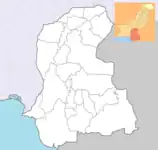Sindhi cap
The Sindhi cap, locally called Sindhī ṭopī (Sindhi: سنڌي ٽوپي) rarely known as the Sindhi Kufi,[1] is a skullcap worn predominantly by Sindhis in Sindh, Pakistan. Together with Ajrak, the Sindhi cap is regarded as an essential part of Sindhi culture.[2][3][4]
.jpg.webp)
History

The Sindhi cap originated during the time of the Kalhoras[5] It was widely worn in Sindh by all except religious people, who wore the turban.[5] It was primarily associated with the higher classes, both Sindhi Muslims and Sindhi Hindus, especially the Amil caste.[6]
In Sindhi culture, the Sindhi cap is often given as a gift or as a sign of respect, along with the traditional Ajrak.[7] Hand-woven Sindhi caps are a product of hard labour and are primarily produced in Tharparkar, Umerkot, Sanghar, and other districts of the Mirpurkhas division of Sindh.[8]
The Sindhi cap, along with Ajrak, is specially celebrated on Sindhi Cultural Day, which was originally named Sindhi Topi Day.[9] In December 2009, for the first time, Sindhi Topi Day was celebrated in Pakistan’s Sindh province to celebrate the Sindhi cap, and Sindhi culture in general. The following year, the day was renamed Sindhi Cultural Day.[9][8]
| This article is part of a series on |
| Culture of Sindh |
|---|
 |
| Culture |
Description

| Part of a series on |
| Sindhis |
|---|
 |
 Sindh portal |
The hat is a cylindrical skullcap with an arch-shaped cut-out on the frontal side. Often worn with the Ajrak, the hat is embroidered with intricate geometrical designs with small pieces of mirrors or gemstones sewn into it.[10]
See also
References
- "Buy Sindhi / Nagina Cap / Kufi / Topi MK#46 - Online in Pakistan | Cultural crafts, Hand weaving, Sindhi people".
- Ring, Laura A. (2006). Zenana: Everyday Peace in a Karachi Apartment Building. Indiana University Press. p. 10. ISBN 978-0-253-21884-1.
- "'Sindhi topi and Ajrak Day' the culture of Sindh". magtimes.com. Archived from the original on 2013-11-04. Retrieved 2013-11-01. Origins of Sindhi Topi
- Ross (C.I.E.), David (1883). The land of the five rivers and Sindh. Chapman and Hall. p. 3.
- Burton, Sir Richard Francis (1851). Sindh, and the Races that Inhabit the Valley of the Indus. W. H. Allen. p. 285.
The peculiar Sindhi cap, which has been compared, not inaptly, to a European hat inverted, was known in the time of the Kalhoras.It is now worn by all but religious characters, who prefer the turban.
- Hughes, Albert William (1874). A Gazetteer of the Province of Sindh. G. Bell and Sons. p. 585.
- "Sindh celebrates Sindh Culture Day". The Express Tribune. 2010-12-04. Retrieved 2021-04-09.
- "Sindh celebrates first ever 'Sindhi Topi Day'". DAWN.COM. 2009-12-06.
- "How Celebrations Of Sindhi Culture Day Started?| Daily Outcome". 2021-12-05.
- Web Desk (2022-02-24). "Pakistan wears many hats, literally". Aaj.tv.